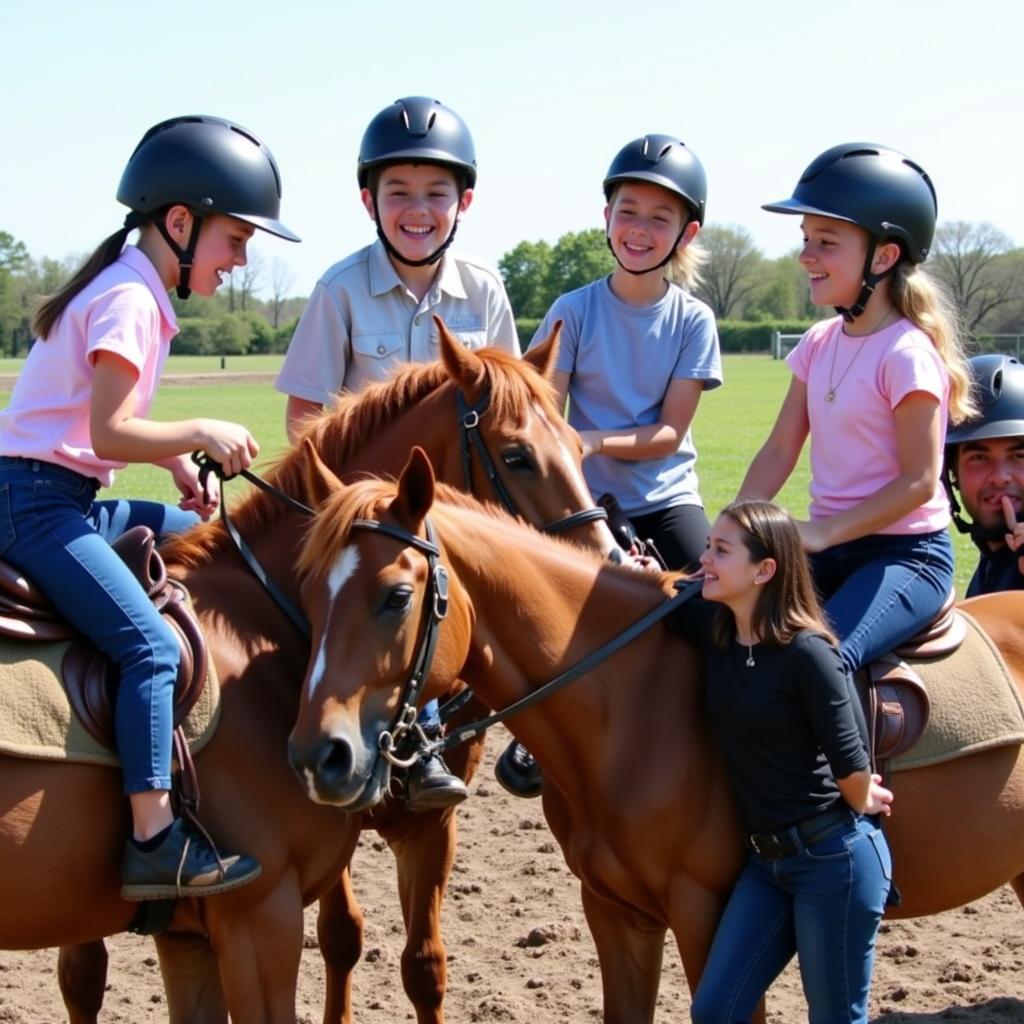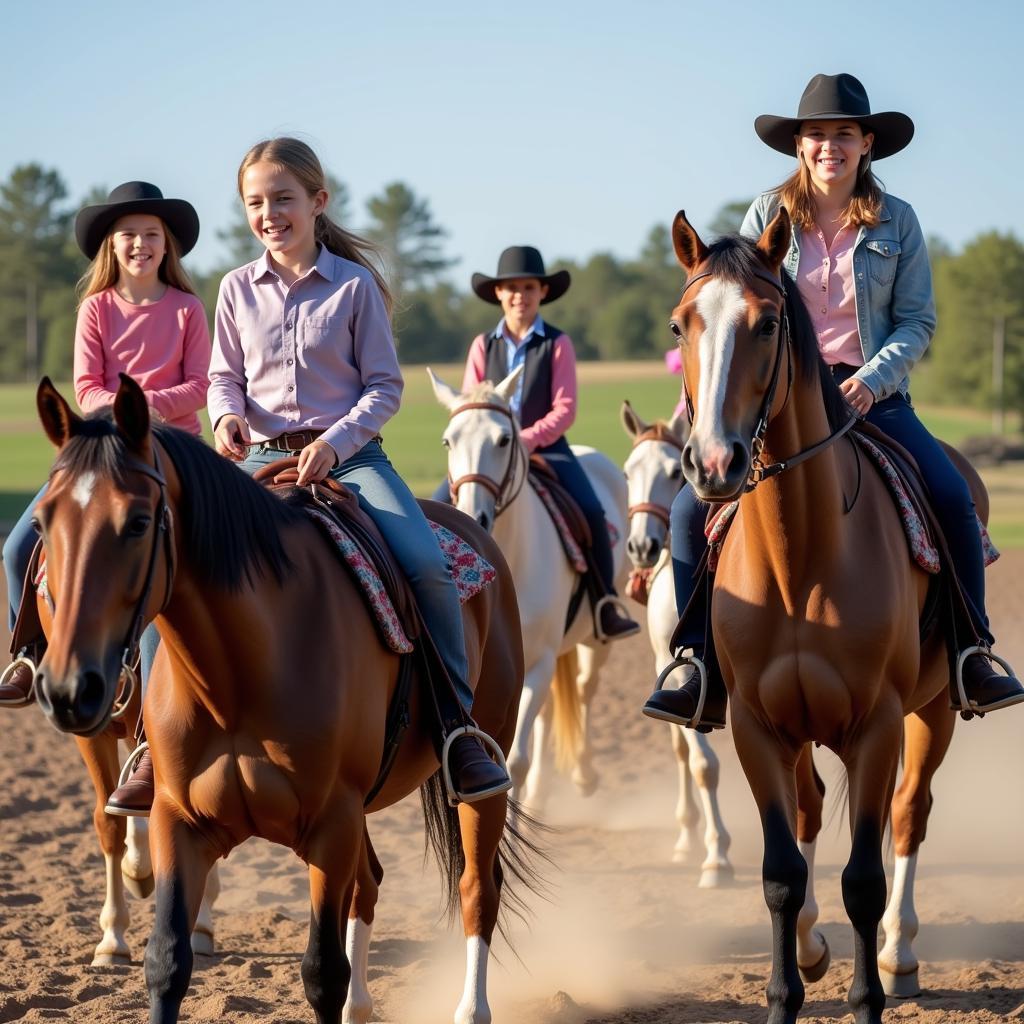Engaging Games for Horseback Riding Lessons
October 21, 2024Learning to ride a horse is an exciting journey, and incorporating games into lessons can make it even more enjoyable and effective. Games For Horseback Riding Lessons provide a fun way to develop essential riding skills, build confidence, and strengthen the bond between horse and rider. Whether you’re a beginner or a more experienced rider, games introduce an element of playfulness that enhances learning and creates a positive learning environment.
 Kids playing horseback riding games
Kids playing horseback riding games
Why Use Games in Horseback Riding Lessons?
Games offer numerous benefits for horseback riding students of all levels:
- Improved Riding Skills: Games often require riders to focus on specific skills such as balance, coordination, steering, and communication with their horse. The playful nature of games encourages riders to practice these skills in a relaxed and engaging way.
- Increased Confidence: Games provide a supportive environment for riders to step outside their comfort zones and try new things. Successfully completing game challenges boosts confidence and encourages riders to push their boundaries.
- Enhanced Horse-Rider Bond: Games often involve teamwork and communication between horse and rider. This shared experience strengthens their bond and builds trust and understanding.
- Fun and Motivation: Games add an element of fun and excitement to lessons, keeping riders motivated and engaged in the learning process.
 Group of kids playing red light green light on horses
Group of kids playing red light green light on horses
Fun and Effective Games for All Levels
Here are some popular and engaging games to incorporate into horseback riding lessons:
For Beginners:
- Red Light, Green Light: This classic game helps riders practice halting and starting their horses promptly. The instructor calls out “red light” (stop) and “green light” (go), encouraging riders to control their horse’s speed and responsiveness.
- Around the World: This game focuses on steering and balance. Riders navigate their horses around a series of cones or obstacles arranged in a circle, improving their ability to guide their horse accurately.
- Simon Says: This game reinforces basic riding commands and improves listening skills. The instructor gives instructions such as “Simon says pat your horse” or “Simon says lift your left hand”.
For Intermediate Riders:
- Pole Bending: This timed event challenges riders to navigate their horses around a series of poles arranged in a specific pattern. It improves the rider’s coordination, balance, and ability to guide the horse precisely.
- Egg and Spoon Race: This classic game translates well to horseback riding and focuses on balance and coordination. Riders carry a spoon with an egg (or a similar substitute) and attempt to complete a course or race without dropping it.
- Follow the Leader: This game encourages riders to pay attention to their surroundings and follow instructions. The lead rider performs a series of maneuvers, and the other riders must follow suit, mimicking the leader’s movements.
For Advanced Riders:
- Mounted Obstacle Courses: Obstacle courses can be customized to challenge riders of all levels. Advanced riders can tackle more complex courses with a variety of obstacles, testing their agility, balance, and communication with their horse.
- Team Penning: This fast-paced game requires teamwork and communication as riders work together to separate specific cattle from a herd and guide them into a pen.
- Mounted Games Competitions: Consider participating in organized mounted games competitions, which offer a wide range of challenging and exciting games designed to test horsemanship skills in a competitive setting.
Tips for Implementing Games in Lessons:
- Safety First: Ensure all riders wear appropriate safety gear, and choose games appropriate for their skill level.
- Clear Instructions: Clearly explain the rules and objectives of each game before starting.
- Positive Reinforcement: Encourage and praise riders for their efforts and achievements, fostering a positive and supportive learning environment.
- Adapt and Adjust: Modify games as needed to suit the riders’ abilities and the available space and resources.
- Keep it Fun: The primary goal is to have fun while learning. Choose games that are engaging and enjoyable for both riders and horses.
Conclusion
Incorporating games into horseback riding lessons offers a multitude of benefits, enhancing the learning experience and creating a more enjoyable and effective training environment. From improving riding skills to boosting confidence and strengthening the horse-rider bond, games transform lessons into exciting adventures. By embracing a playful approach to learning, riders of all levels can develop their horsemanship skills while nurturing a deeper connection with these magnificent animals.
FAQs:
Q: Are horseback riding games safe?
A: Horseback riding games can be perfectly safe when conducted with proper precautions and under the guidance of a qualified instructor. Safety gear is essential, and games should always be adapted to the riders’ skill levels.
Q: What if my horse doesn’t want to play games?
A: Not all horses are equally enthusiastic about games. Start with simple activities and gradually introduce more challenging games. Use positive reinforcement and avoid forcing a horse that seems uncomfortable or stressed.
Q: Can I create my own horseback riding games?
A: Absolutely! Get creative and design games that target specific skills or challenges. You can even involve your fellow riders in brainstorming new game ideas.
Need further assistance with your horseback riding journey?
Contact us at Phone Number: 0915117117, Email: [email protected], or visit us at our address: To 3 Kp Binh An, Phu Thuong, Viet Nam, Binh Phuoc 830000, Vietnam. Our dedicated customer support team is available 24/7 to answer your questions and provide guidance.